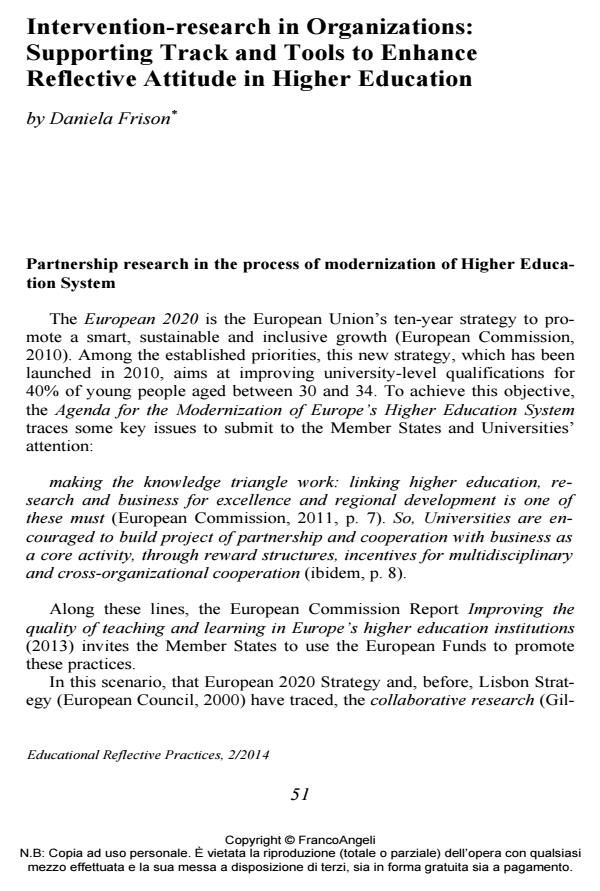Intervention-research in Organizations: Supporting Track and Tools to Enhance Reflective Attitude in Higher Education
Titolo Rivista EDUCATIONAL REFLECTIVE PRACTICES
Autori/Curatori Daniela Frison
Anno di pubblicazione 2015 Fascicolo 2014/2
Lingua Inglese Numero pagine 19 P. 51-69 Dimensione file 376 KB
DOI 10.3280/ERP2014-002004
Il DOI è il codice a barre della proprietà intellettuale: per saperne di più
clicca qui
Qui sotto puoi vedere in anteprima la prima pagina di questo articolo.
Se questo articolo ti interessa, lo puoi acquistare (e scaricare in formato pdf) seguendo le facili indicazioni per acquistare il download credit. Acquista Download Credits per scaricare questo Articolo in formato PDF

FrancoAngeli è membro della Publishers International Linking Association, Inc (PILA)associazione indipendente e non profit per facilitare (attraverso i servizi tecnologici implementati da CrossRef.org) l’accesso degli studiosi ai contenuti digitali nelle pubblicazioni professionali e scientifiche
This paper presents a research developed at the University of Padua with the aim to observe the learning results of a University-Business Cooperation experience in humanities. The research involved 18 graduating students in Continuing Education and Management of Educational Services who planned and put in practice an intervention- research on organisation’s needs and questions. This contribution focuses on strategies and tools to support their research process and their relationship between the two reference organisations: university and enterprise. Processes and tools to enhance reflective attitude are presented and analysis of data collected are explored
- Baron, X. (2008). Quels dialogues entre chercheurs et consultants?. Savoirs, 16, 11-52.
- Brochbank, A., & McGill, I. (2006). Facilitating reflective learning in Higher Education. London: Kogan Page.
- Bussières, D. & Fontan, J.M. (2011). La recherche partenariale : point de vue de praticiens au Québec. SociologieS.
- Buysse, A., & Vanhulle S. (2009). Écriture réflexive et développement professionnel: quels indicateurs?. Questions Vives.
- Cicognani, E. (2002). Psicologia sociale e ricerca qualitativa. Roma: Carocci.
- Dejemeppe, X., & Dezutter, O. (2001). Quels écrits réflexifs autour des stage professionnels? Recherche et formation, 36, 89-111.
- Delahaye, B., Choy, S.C. (2008). A learning partnership with a university: some considerations for industry. Desroche, H. (1990). Entreprendre d’apprendre. D’une autobiographie raisonnée aux projets d’une recherche-action (Apprentissage 3). Paris: Editions ouvrières.
- European Commission (2010). Europe 2020. A strategy for smart, sustainable and inclusive growth. europa.eu/LexUriServ/LexUriServ.do?uri=COM:2010:2020:FIN:EN:PDF.
- European Commission (2009). A new partnership for the modernisation of universities: the EU Forum for University Business Dialogue.
- European Commission (2011). Supporting growth and jobs – an agenda for the modernisation of Europe’s higher education systems.
- European Commission (2013). Report to the European Commission on Improving the quality of teaching and learning in Europe’s higher education institutions. Luxembourg: Publications Office of the European Union.
- European Council (2000). Presidency conclusions.
- Fabbri, D. & Munari, A. (2005). Strategie del sapere. Verso una psicologia culturale. Milano: Guerini.
- Flicker, S. & Savan, B. (2006). A Snapshot of CBR in Canada. Toronto: Wellesley Institut.
- Frison, D. (2011) (Eds). Dialogo università-imprese: quale contributo dalle scienze umane?. Napoli: ESI.
- Gibbons, M. et al. (1994). The New Production of Knowledge. The Dynamics of Science and Research in Contemporary. London: Sage.
- Gilardi, S., & Bruno, A. (2006). Action-Research negli studi organizzativi: lo stato dell’arte. Risorsa Uomo, 3-4 (12), 129-149.
- Gillet, A., & Tremblay, D.G. (2011). Conditions, dynamiques et analyses des partenariats de recherche. SociologieS.
- Godin, B. & Gingras, Y. (2000). Impact de la recherche en collaboration et rôle des universités dans la production des connaissances. Sciences de la Société, 49, 11-26.
- Griffiths, R. (2004). Knowledge production and the research-teaching nexus: the case of the built environment disciplines. Studies in Higher Education, 29 (6), 709-726.
- Healey, M. (2005). Linking research and teaching: exploring disciplinary spaces and the role of inquiry-based learning. In R. Barnett (Eds.), Reshaping the University: New Relationships between Research, Scholarship and Teaching (pp.67-78). McGraw Hill / Open University Press.
- Heron, J., & Reason, P. (2001). The Practice of Co-operative Inquiry: Research “with” rather “on” People. In P. Reason & H. Bradbury (Eds.) Handbook of Action Research (pp. 179-188). London: Sage.
- Jenkins, A., & Healey, M. (2005). Institutional strategies to link teaching and research. Heslington: The Higher Education Academy.
- Lancia, F. (2004). Strumenti per l’analisi dei testi. Introduzione all’uso di T-LAB. Milano: Franco Angeli.
- Lewin, K. (1948). Resolving social conflicts; selected paper on group dynamics. New York: Harper & Row.
- Martinez, C. (1995). Du faire au dire: écrire sa pratique. Grex, 1. Retrieved from www.expliciter.fr.
- Meyer-Kramer, F., & Schmoch, U. (1998). Science-Based Technologies : University-Industry Interactions in Four Fields. Research Policy, 27, 835-851.
- Mérini, C., & Ponté, P. (2008). La recherche-intervention comme mode d’interrogation des pratiques. Savoirs, 1 (16), 77-96.
- Moon, J. (2003). Learning journals and logs, reflective diary. Centre for Teaching and Learning, University of Exeter.
- Moon, J. (2004). Esperienza, riflessione, apprendimento. Manuale per una formazione innovativa. Roma: Carocci. Mortari, L. (2003). Apprendere dall’esperienza. Il pensiero riflessivo nella formazione. Roma: Carocci.
- Munari, A. (1998). Una metodologia degli eventi per la formazione e la ricerca. Studium Educationis, 3, 429-436.
- Munari, A. (2010). Promuovere consapevolezza epistemica. In C. Xodo & M. Benetton (Eds.), Che cos’è la competenza? Costrutti epistemologici, pedagogici e deontologici. Atti della VII Biennale Internazionale sulla Didattica Universitaria (pp. 45-54). Lecce: Pensa Multimedia.
- Schön, D.A. (1983). The Reflexive Pratictioner. New York: Basic Books.
- Schön, D.A. (1993). Il professionista riflessivo. Bari: Dedalo.
- Senge, P., & Scharmer, O. (2001). Community Action Research: Learning as a Community of Practitioners, Consultants and Researchers. In P. Reason & H.
- Bradbury (Eds.), Handbook of Action Research (pp. 238-249). London: Sage.
Daniela Frison, Intervention-research in Organizations: Supporting Track and Tools to Enhance Reflective Attitude in Higher Education in "EDUCATIONAL REFLECTIVE PRACTICES" 2/2014, pp 51-69, DOI: 10.3280/ERP2014-002004